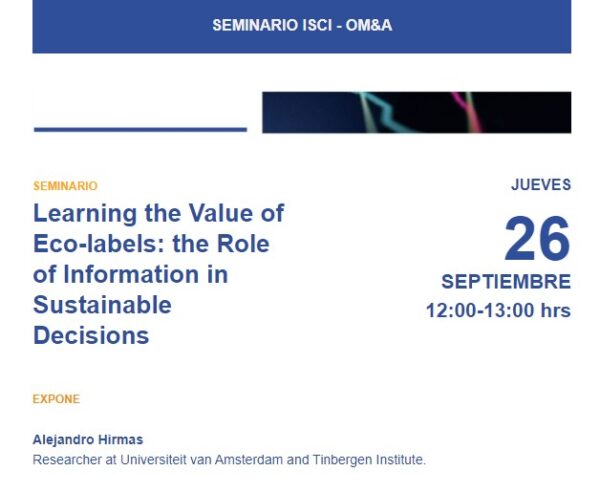Seminario ISCI OM&A: Learning the Value of Eco-labels: the Role of Information in Sustainable Decisions
Seminario ISCI OM&A: Learning the Value of Eco-labels: the Role of Information in Sustainable Decisions
Presenta: Alejandro Hirmas, Researcher at Universiteit van Amsterdam and Tinbergen Institute
Fecha: 26 de septiembre 2024
Horario: 12:00 – 13:00 horas
Lugar: Beauchef 851, Sala de Consejo. Piso 4
Inscripciones en: Seminario ISCI OM&A
Organiza: Instituto Sistemas Complejos de Ingeniería (ISCI)
Abstract: Sustainability ratings help consumers understand the environmental impact of their purchases. Such ratings have increased the consumers’ sustainable choices in the electrodomestics and housing markets. In the particular case of energy labels, sustainable products are also associated with private benefits due to future cost reductions in energy expenditure. These results question the potential effectiveness of sustainability ratings for other products, such as food, where the link between environmental and private benefits is less clear. In two incentivized experiments (N=749), we study how consumers use sustainability ratings when these ratings are dissociated from private benefit, i.e. product quality. Participants chose between two products based on their quality and sustainability, which were presented in separate rating scales, alongside the products’ prices. Furthermore, we study how consumers integrate the usage of ratings with other information provided from other sources. Halfway through the experiment, we provide information regarding the underlying value behind the ratings. Using a between-subject design, we modify the information provided and analyze the impact of such information on the participants’ subsequent choices. Our findings indicate that even when sustainability ratings are not connected to the products’ quality, participants make use of them to decide which products to buy. We also find that participants underreact to new information, and make inefficient choices based on their decisions from before. Moreover, to track the participants’ attention and analyze potential heterogeneous usage of the information we use process-tracing methods. We find that participants show highly heterogeneous attention patterns, which are linked to differential weighting of the product’s attributes (price, quality, and sustainability) during the decision. While our information treatment has little effect on attention allocation to individual attributes, participants correctly recall the information at the end of the experiment. These results suggest that participants partially neglect new information, and anchor to their initial decision rules formed before the information treatments.



